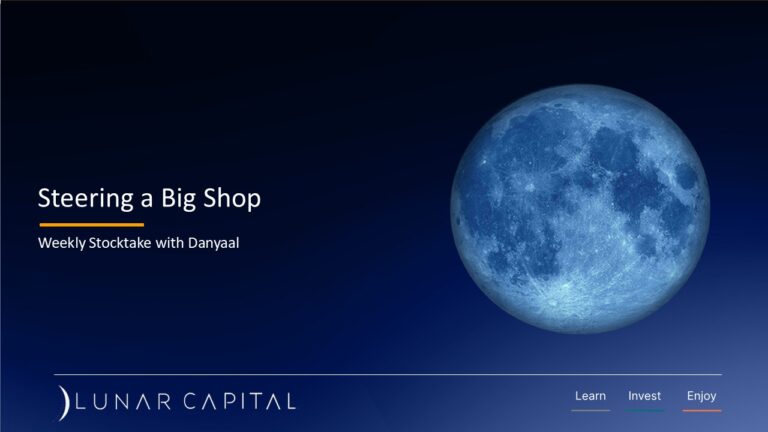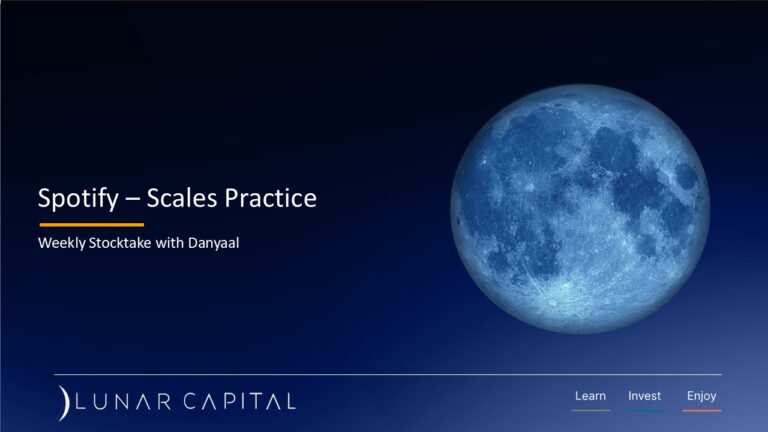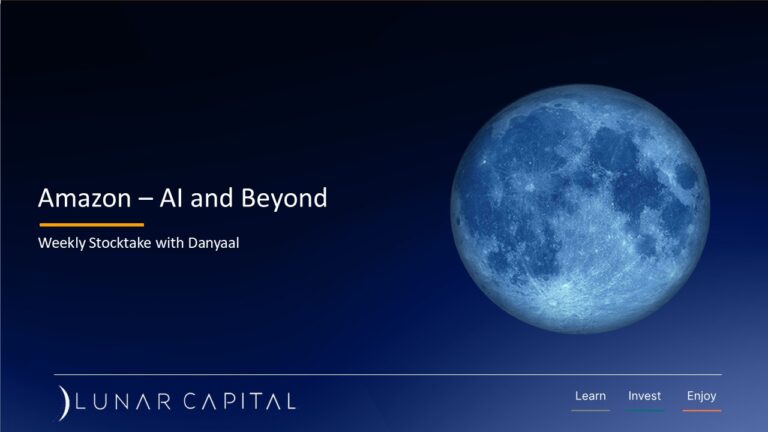14 July 2023
Key Indicators
| Index / Fund / Rate | Start of Year | Last week | This Week | % change YTD |
|---|---|---|---|---|
| Lunar BCI WW Flexible Fund | 141.43 | 173.98 | 171.24 | 21.08% |
| JSE ALSI | 73 049 | 74 443 | 77 751 | 6.44% |
| NASDAQ Composite | 10 467 | 13 661 | 14 114 | 34.84% |
| S&P 500 | 3 840 | 4 399 | 4 505 | 17.33% |
| Prime Lending Rate | 10,50% | 11.75% | 11.75% | 11.90% |
| USD/ZAR | 16,98 | 18.88 | 18.08 | 6.48% |
| EUR/ZAR | 18,44 | 20.72 | 20.32 | 10.20% |
| Brent Crude ($’barrel) | 85,95 | 76.50 | 79.58 | -7.41% |
Source: Iress
Weekly Stocktake with Danyaal
US vs China: Battle on the Semiconductor Front
Semiconductors are vital components found in virtually every electronic device. They serve as the “electronic brain” in various gadgets, ranging from smartphones and cars to data centres and TV remotes. In fact, a single vehicle may contain numerous chips. While some chips perform basic functions like controlling window movements, others perform more intricate functions like controlling fuel and air mixes and providing vital feedback to the driver or in fact even controlling the vehicle..
Today, more and more powerful chips perform highly complex and sophisticated functions Artificial Intelligence (AI) applications, precise military weaponry, and robotic functions, amongst others.
Tensions between the US and China are intensifying in the realm of AI and military applications. In October of last year, the US implemented export controls aimed at effectively barring China from manufacturing or acquiring advanced semiconductors. This move seeks to prevent China from gaining further technological advantages in the development of surveillance and military systems.
There are four important factors at play in the Semiconductor industry that could render the US’s export controls effective.
1. Semiconductors are a truly globally-manufactured product. The production of high-performance chips necessitates the seamless collaboration of multiple highly specialized businesses, around the world. Take, for instance, an Nvidia chip utilized in data centres. Nvidia, based in the US, designs the chip, which is then sent to a TSMC fabrication plant in Taiwan for manufacturing. The construction of these fabrication plants requires specialized equipment from ASML, located in the Netherlands. The sourcing of raw materials and components for all of this comes from numerous suppliers around the world. Subsequently, the finished products are shipped to Nvidia’s customers worldwide. If China were to keep up (or takeover) the US, they would need to build this all within their borders.
2. Although the semiconductor industry operates on a global scale, it is characterized by a limited number of key suppliers. ASML, for instance, holds an effective monopoly in the production of lithography equipment. Their machines, priced at around $150 million each, are as large as trucks and require dedicated teams of engineers to build and operate them within fabrication plants. TSMC accounts for approximately 30% of the world’s market for contract chip fabrication. The effectiveness of the US’s export controls hinges on the cooperation of the Netherlands and Taiwan, where ASML and TSMC are based, respectively. These countries have implemented their own export controls on China, thereby bolstering the potential success of the US’s measures.
3. If China were unable to develop its own domestic semiconductor production capabilities and resorted to acquiring high-end chips through the black market, it would encounter significant challenges. The number of buyers for chips are limited, and these buyers typically make bulk purchases to fulfil their requirements. Data centres, for instance, rely on thousands of chips to operate within their large-scale facilities.
4. Additionally, the semiconductor industry progresses at a rapid pace. According to Moore’s Law, the computing power of semiconductors doubles every two year while the costs halve. If China managed to obtain chips or the equipment required for their production, they would likely acquire technology at the trailing edge, lacking the cutting-edge advancements and cost efficiencies offered by the latest semiconductor innovations.
The race is not over yet. China is pouring money into developing their market. The US is taking a risk: if the export controls prove successful, they could effectively hinder China’s progress for years to come. However, if these restrictions fail, China may emerge even stronger with a flourishing semiconductor industry under its complete control within its own borders.
ASML and Nvidia are held in the Lunar BCI Worldwide Flexible fund. They are also held by the Lunar Capital Offshore Portfolio Clients.
Connect with us on social media:
LinkedIn: https://bit.ly/413pDnr
Facebook: https://bit.ly/3ScL7Km
Instagram: https://bit.ly/3ICEjCJ
Lunar Capital on Eastwave Radio
Every Tuesday, at 07h45, Sabir chats with Nazia from Eastwave Radio (92.2 fm, live stream on www.eastwave.co.za) on investing and the markets.
Click here to access your account to view statements, obtain tax certificates, add, or make changes to your investments.
Our email address is: [email protected]
Lunar Capital (Pty) Ltd is a registered Financial Services Provider. FSP (46567)
Read our full Disclosure statement: https://lunarcapital.co.za/disclosures/
Our Privacy Notice: https://lunarcapital.co.za/privacy-policy/
The Lunar BCI Worldwide Flexible Fund Fact Sheet can be read here.
This stocktake is prepared for the clients of Lunar Capital (Pty) Ltd. This stocktake does not constitute financial advice and is generated for information purposes only.





